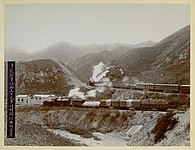Beijing–Baotou railway
The Beijing–Baotou railway or Jingbao railway (simplified Chinese: 京包铁路; traditional Chinese: 京包鐵路; pinyin: Jīngbāo Tiělù) is an 833 km (518 mi) railway from Beijing to Baotou, Inner Mongolia, functioning as an important route in North China.
The first section of this railway, the Imperial Peking–Kalgan railway (now the "Jingzhang" railway) was constructed between 1905 and 1909, connecting Beijing with Zhangjiakou (Kalgan). This section was the first railway designed and built by Chinese. The chief engineer is Jeme Tien Yow. He overcame the steep gradient near Badaling using a switchback. Due to his achievement in constructing this railway, Zhan (Jeme) is called the father of China's railways.
The railway was extended from Zhangjiakou to Hohhot by 1921 and to Baotou by 1923.
Even with the switchback, the gradient near Qinglongqiao railway station is still at 3.3%. In addition, travelling through the switchback is slow. A bypass route, Fengsha railway, was built in the 1950s between Fengtai and Shacheng along the Yongding river. This route was dropped by Zhan due to high construction cost. Before the 1990s, the Fengsha railway was mainly used to transport cargos, and the original Jingzhang railway was focused on the passenger transportation. Now, most of the trains coming from Baotou have changed to use Fengsha railway instead. The Qinglongqiao railway station, where the switchback is located, is the station serving the Great Wall near Badaling.
Both Jingbao railway and Fengsha railway are double-track railways. The section between Hohhot East and Baotou railway station is quadruple track.
Stations and mileage
An express train travels the full distance in approximately 14 hours.
- Beijing (北京)
- Beijing East (北京东)
- Xinghuo (星火)
- Wangjing (望京)
- Huangtudian (黄土店)
- Shahe (沙河)
- Changping (昌平)
- Nankou (南口)
- Dongyuan (东园)
- Juyongguan (居庸关)
- Sanpu (三堡)
- Qinglongqiao (青龙桥)
- Qinglongqiao west (青龙桥西)
- Badaling (八达岭)
- Xibozi (西拨子)
- Kangzhuang (康庄)
- Donghuayuan (东花园)
- Tumu (土木)
- Shacheng (沙城)
- Xinbaoan (新保安)
- Xibali (西八里)
- Xiahuayuan (下花园)
- Xinzhuangzi (辛庄子)
- Xuanhua (宣化)
- Shalingzi east (沙岭子东)
- Shalingzi (沙岭子)
- Zhangjiakou South (张家口南)
- Shalingzi West (沙岭子西)
- Zhangjiakou (张家口)
- Kongjiazhuang (孔家庄)
- Wangyuzhuang (王玉庄)
- Guoleizhuang (郭磊庄)
- Chaigoubao (柴沟堡)
- Xiwanbao (西湾堡)
- Yongjiabao (永嘉堡)
- Xiaxiaobao (夏小堡)
- Tianzhen (天镇)
- Luowenzao (罗文皂)
- Yanggao (阳高)
- Wangguanrentun (王官人屯)
- Julebao (聚乐堡)
- Zhoushizhuang (周士庄)
- Datong east (大同东)
- Datong (大同)
- Gudian (古店)
- Gushan (孤山站)
- Baoziwan (堡子湾站)
- Wutaiwa (五台洼站)
- Fengzhen (丰镇站)
- Jiandi (监地站)
- Xin'anzhuang (新安庄站)
- Yongwangzhuang (永王庄站)
- Hongshaba (红砂坝站)
- Suojiacun (索家村站)
- Tuguiwula (土贵乌拉站)
- Naji (纳继站)
- Suji (苏集站)
- Guyingpan (古营盘站)
- Jining south (集宁南站)
- Hulu (葫芦站)
- Sanchakou (三岔口站)
- Basumu (八苏木站)
- Shibatai (十八台站)
- Hala (哈拉站)
- Magaitu (马盖图站)
- Gujiabao (姑家堡站)
- Zhuozishan (卓资山站)
- Fushengzhuang (福生庄站)
- Anju (安居站)
- Sandaoying (三道营站)
- Mengguying (蒙古营站)
- Qixiaying (旗下营站)
- Minzu (民族站)
- Taobuqi (陶卜齐站)
- Guojiaying (郭家营站)
- Baita (白塔站)
- Nandian (南店站)
- Hohhot (呼和浩特站)
- Youyouban (攸攸板站)
- Taigemu (台阁牧站)
- Dalibao (大里堡站)
- Bikeqi (毕克齐站)
- Chasuqi (察素齐站)
- Songla (宋拉站)
- Taosihao (陶思浩站)
- Sanbashu (三八树站)
- Meidaizhao (美岱召站)
- Laozang (老藏站)
- Salaqi (萨拉齐站)
- Gongjiban (公积坂站)
- Dongxing (东兴站)
- Guchengwan (古城湾站)
- Baotou east (包头东站)
- Wanshuiquan (万水泉站)
- Baotou (包头站)
| Major Station | Mileage (km) |
|---|---|
| Beijing (北京) | 0 |
| Shacheng (沙城) | 121 |
| Xuanhua (宣化) | 171 |
| Zhangjiakou South (张家口南) | 196 |
| Datong (大同) | 374 |
| Jining south (集宁南) | 501 |
| Hohhot (呼和浩特) | 659 |
| Baotou (包头) | 824 |
Gallery
-
The Qinglongqiao Station in 1908
-
Sun Yat-sen inspecting the Beijing–Zhangjiakou railway at the Zhangjiakou railway station in 1912, shortly after the founding of the Republic of China.
-
Bridge over the Yongding River in 1952
-
A NDJ3 DMU trainset at Badaling in 2012.
See also
- List of railways in China
- Rail transport in Inner Mongolia
- Rail transport in the People's Republic of China





